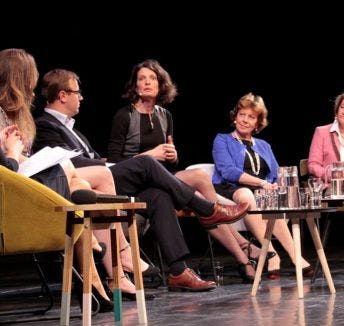
Tessa is her name, the social robot from startup Tinybots that supports dementia patients and their families. Founders Robert Paauwe and Wang Li Long want their high-tech help to appear in living rooms as quickly as possible.
What is Tinybots?
The startup – based at Rockstart in Nijmegen – is working on the development of Tessa; a tabletop robot that activates people with dementia by voice information or suggestions to, for example, eat or make a shopping list for home care. Furthermore, it plays personal music to reassure the patient.
Tessa doesn’t look like a machine, but neither does it look like a plush toy: with its wood tones it fits between vases and other trinkets. At set times Tessa talks to her roommate, proposes to play a tune, or even to get some fresh air. The robotic figures after a long period of silence that it is time to take action, and can also be programmed with an app by a relative or caregiver, who can announce their arrival in advance so that the user of Tessa can prepare for them. Though Tessa answers simple questions and adapts to her room mate, she is not a chatbot. It seems simple, but Tessa is based on years of research into design and functionality and the needs of caregivers and patients.
Who are the minds behind Tinybots?
After their studies at TU Delft, Robert Paauwe (28) and Wang Li Long (31) did 3,5 years of research at the Amsterdam VU on the use of social robots in healthcare. Their work received greater attention in the documentary film I’m Alice. “We did not started with a technical solution to find a problem for that, but we really investigated the needs of patients, caregivers and all stakeholders who can be helped with robotica”. Meanwhile, the founders are working on the final phase of their doctoral research, but the development of Tessa get their full attention. “Now is the time to do this, we want to help healthcare as soon as possible”, says Paauwe.
Who will benefit from Tessa?
First and foremost, the patients and their caregivers. “Caring for a relative with dementia is intense and psychologically demanding; it often leads to an overload for the caregiver”, says Paauwe. “By helping to activate the person with dementia, we hope to relieve them, and we ensure that the relationship is completely determined by the need for care.” Initially Tinybots focuses on caregivers with their marketing: they will be able to use Tessa for 1 euro a day. “We also want to work with healthcare institutions and health insurances, but that will be a longer process. In the short term, we have experienced that family and carers are willing to purchase assisting devices.”
What is the business model?
Tinybots choose to work with a subscription model, to make Tessa as accessible as possible. “You do subscribe for at least one year. Dementia is a very changeable disease, the robot will have to grow with the patient and adapt to the needs of the person with dementia. Tinybots facilitates that Tessa continues to learn and adapt to the user. Through a subscription model, more features will be developed and users receive updates regularly.” Paauwe and Li will be planning a pre-order campaign, as soon as the robot is available.
What is the status of Tinybots?
There is a prototype that has been carefully tested. “Dementia care is a sensitive issue, so we have limited our first test sessions to one day.” The aim is to have several Tessa’s around as soon as possible to prove its added value. Then within eighteen months there should be a production version ready. Tinybots recently won the Rotterdam Starters Prize. “Indeed, we are based in Nijmegen and Amsterdam, but Rotterdam is also an important city to start because this city has the highest number of dementia patients in the Netherlands. We would be happy start collaborating over there.”
Need funding?
Yes. Paauwe and Long Li put their savings in Tinybots, which received an investment in exchange for shares thanks to Rockstart. But the company itself needs funding, especially for the development of software and hardware. And if the business model is based on 1 euro a day, investors are also needed to help improve care for people with dementia. Tessa could also prove its worth in other groups, such as people with brain injury and autism.
Are you interested in hearing more about Tinybots and the added value of social robotics to healthcare? Founder Robert Paauwe will be speaking on June 7th at Amsterdam Talks Tech: The Health Edition. For the full programme and to get your hands on tickets, visit our event page.
Contributed by Philip Bueters of Sprout.nl. You can read the original in Dutch here.
Share this article
 Read now The Next Women in Business
Read now The Next Women in Business
 Read now E-health Will Become Health: The Future of Medical
Read now E-health Will Become Health: The Future of Medical